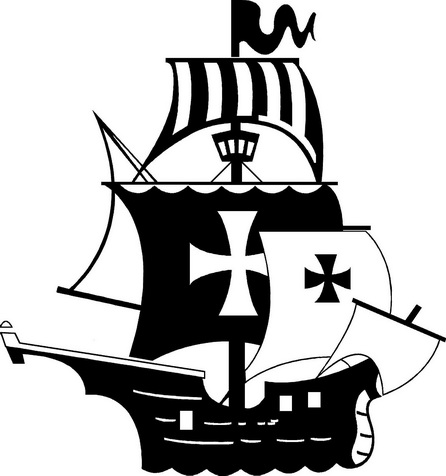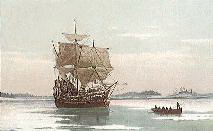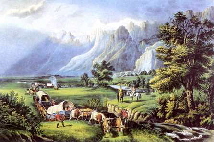|
Why a Learning Adventure?
Learning SHOULD BE a wonderful adventure! We all learn best and most completely when we are enjoying what we are learning! When learning is meaningful
to us, it becomes an adventure! If our teaching methods are not meaningful and adventure-filled, our children don't learn and retain the information as completely. The idea of a unit study learning adventure
becomes an alternative to "covering" skills, concepts, and topics by means of reading a chapter, doing a workbook page, and taking a test, which doesn't automatically equate with really knowing, understanding,
remembering, applying and building on those things! At Learning Adventures, we believe that the unit study method is the best way to make learning meaningful and memorable!
What IS a unit study?
A unit study takes a topic and focuses on it, weaving all subjects around that one topic. Instead of using textbooks and workbooks to learn, unit studies
rely on real, living books and other resources such as magazines, Internet information, audio CD's, biographical journals, and DVD's for gathering information on each topic. We also use experiential and discovery
learning in the form of activities, cooking projects, experiments, application projects, and field trips to reinforce what we are learning.
Are unit studies always based on history?
Unit studies can be based on any subject - literature, science, fine arts, geography, etc. Some unit studies only focus on one or two subjects in the
curriculum, such as literature and history while other studies include all the curriculum subjects in the study. Our unit studies are based on chronological history, and they include all the other curriculum subjects as
well, which branch from the history base. For that reason, if you are teaching a student in grades 4-8, you only need a math program in addition to Learning Adventures to complete your curriculum.
Which subjects are covered in the Learning Adventures volumes?
Broad subject areas covered in each volume are:
- Bible/Character Training
- Language Arts/Literacy
- Social Studies
- Science
- Fine Arts
Each subject is listed separately, but whenever possible, subjects are overlapped to make learning more efficient and meaningful. Various components
of each of these subjects are covered throughout the days of each volume. For example, Language Arts/Literacy studies include grammar, poetry, oral communication, literature, writing, study skills, spelling, and
vocabulary. Social Studies include cultures and communities, geography, map and globe skills, history, government, and career education. So, for example, history might be our focus one day, while geography will be
the focus on another day. Math is not covered in our unit studies, so parents must supply a program of their choice for each child.
Do the Learning Adventures curriculum guides really provide scripted lesson plans or are
they in a chart format that requires planning by the parent?
Each curriculum guide in our series provides 180 days of scripted lesson plans in a daily format. Each volume really does tell you in a conversational
format exactly what to do each day, which books are required, and includes hands-on activities, recipes, and project ideas. Ideas and activities for extended learning adventures are included along with lists of required
materials and book lists are provided at the beginning of each unit. All the planning is done for you! You just have to read ahead so you will know your pathway and will be able to make slight adjustments to account
for each of your child's learning styles and abilities.
What are the target grades of volumes in the Learning Adventures series?
Each of the Learning Adventures curriculum guides is in a multi-grade format and includes skills and concepts for grades 4 through 8. To clarify for parents
coming from a graded approach to learning, Volume 1 is for grades 4-8, Volume 2 is for grades 4-8, and Volume 3 is for grades 4-8. (Volume 1 is NOT just for fourth grade and Volume 2 is NOT just for fifth grade, for
example.) Parents may easily simplify or supplement the material in various areas to meet the needs of younger and older children that are also joining the study. As long as at least one other child in grades 4-8 is
using the same curriculum guide as is, it works to bring younger or older children into the study.
How will I know which supplies I will need?
Because unit studies rely on hands-on activities to reinforce learning, you will need supplies for those activities. Many of these supplies you will already
have at home, such as paint, glue, flour, salt, string, tape, and a flashlight. You will have to purchase other supplies, but most of these will be things you will be able to use again for other things. We always
provide a convenient list of needed supplies you will need for each day in the beginning section of each unit.
How will I know which required books to use?
There are required literature selections in each of our volumes. There is a list of these required books on this web site under each volume page. In
addition, there is a list of required books in the Introduction to each volume. We also remind you of any required books you will need on the day you will first need it on the daily supplies list. Many people choose
to purchase the required books, and some check them out of the library. These books will potentially be found in libraries across the nation, but each library has a unique selection of books, and we say they are
"required" for a reason . . . you really do need them when we call for them. So, whether you use the library or purchase them, you will need to be sure you have a copy in your hand on the day it is
required. You will also need many other library books for this study to complement the unit topics, because that's how a unit study works. We give you lists of ideas for these books in the curriculum - but it
doesn't matter which books you check out of the library - you can choose a completely different set of books to use with the units based on your library's selection and books you have at home that pertain to the topics.
How long does this unit study take each day?
This is very possibly the most difficult question to answer of all of the many questions we get. Each family carries out our unit studies differently and
uniquely. Each family has different needs, different students, different lifestyles, and different family commitments. Some have many children, others have just one or two - some have babies and toddlers while others
are teaching just intermediate students. Some children have very special needs while others do not. For some children, learning has just not been their favorite thing, because they prefer sports or music or other
activities while others are super-achievers when it comes to learning. When all of these things factor in to the length of a day in our volumes, it is impossible to provide a "typical" day-length, since there
simply is no such thing! Having said all of that - if you are doing the study for less than three hours a day (not including math) - you might not be doing enough (for most families) unless you have a special
situation. If you are doing the study for a lot more than six hours a day, you are probably doing things in a more cumbersome way than we would have intended (and feel free to contact us if you are feeling
overwhelmed!) In any case - it doesn't really matter how long I say it "might" take each day. That's because, although our plans are set up in a daily format, it doesn't matter if you finish the
plans for Day One on your first day, and the same applies for every day. In order to account for the busyness and interruptions of life on a daily basis - it's important to remain flexible and focus on learning as much
as we can each day - but keep everything in perspective as well. For example, if you finished about 3/4 of the day and your friend called to say that there was an air show at the local airport that afternoon (which really
happened to us one day) you should put a post-it note in your curriculum guide to mark your place, grab your camera, a notebook to jot down a few notes and illustrations, and head to the air show! The next day, you would
start right where you stopped the prior day. Using this method of progression ensures that you ARE making learning progress - but you are also realistic about working around dentist appointments, ballet, soccer, and well .
. . life. Let's face it, there are also those days (hopefully fewer rather than more) on which you come to a point where you know that no more learning is going to take place! Hopefully this is also at the end of
the morning or in the early afternoon rather than first thing in the morning! In any case, the most important thing to remember is that you are in compliance with your state homeschooling guidelines and taking your
responsibilities as a teacher for your children seriously and joyfully.
Does this mean I can extend the study over more than one year?
Many families do the study exactly as written and complete it in 180 days. However, many families extend the study over more than one year, because they
really enjoy spending as much time as desired on each topic. They might spend a day or two extra on a particular topic just reading more or researching or visiting a local historical site (or whatever). If you extend
a topic, you just won't finish that particular volume in exactly one school year. It's really best to continue moving through the curriculum at a pace that works best for you each day. If you finish five of
six units in one school year and added lots of other enriching learning experiences during that time - then pick up with the sixth unit in that volume when school starts again in the late summer months.
Can you provide an example of how the concept of a unit study applies Learning Adventures?
The first unit in our first volume, A World of Adventure, is based on Ancient Egypt. All other topics are integrated with that topic - our Bible
stories focus on the stories of Joseph and Moses (since their stories took place in Egypt). Our literature is a historical fiction selection about an Ancient Egyptian mystery, The Golden Goblet. Other elements
of language arts also follow the Ancient Egyptian theme - new words, grammar exercises, Latin and Greek root words, and writing lessons reflect that theme as we cover the basic language arts skills and concepts for the
intermediate grades. Science lessons focus on both biological and physical sciences as they pertain to the Desert Ecosystem, which is also connected to the Egyptian theme. The Fine Arts focus is also on Egypt as we
explore the art and architecture of Ancient Egypt. Because the subjects are integrated, they build on each other and the maximum impact in learning is much more likely achieved.
What are the benefits of studying history chronologically?
Because each volume continues the chronological flow, it provides continuity for the student, and it helps put history into context rather than studying history
out of order. While a child "can" learn history out of order, we just think it's easier to remember when we study it in order - the way it really happened. Volume 1 focuses on Ancient, Medieval, and
Renaissance History. Beginning with Volume 2, the history presentation continues within the context of American History beginning in 1600, but other country studies and events are covered as they apply to the events in
American History. Thus, Volume 2 is presented from 1600-1800 and the American Colonial, Revolutionary, and Federal Periods are the focus, but a study of Canada is also included since it fits perfectly into that
period. American History from 1800-1860 is the focus of Volume 3 with studies of France, The United Kingdom and Ireland, Mexico, Scandinavia (Norway, Sweden, Denmark, Iceland, and Finland), Greenland, and China are also
included.
Please explain more about how other country studies are included.
A good example of how other country studies fit into an American History theme is from Volume 3. The Texas Revolution is included in this volume, and the
students will be exploring the topics and events surrounding this part of American History. They will find that Mexico plays an integral role in this period and that finding out much more about Mexico will be extremely
beneficial to their understanding of what happened in those years. In order to get a "whole picture" of Mexico and to learn more about that time in history - we use a sort of "teaching moments" style of
learning. We insert a study of Mexico right at that time, just when the students' are most curious and eager to learn more about it! We study "everything Mexico" at that point - historically, from
ancient times to current events, geographically, culturally, economically, and governmentally. Along the way, we connect the other subjects to that topic and we create a notebook section about that country. The Mexico
section will be added to a comprehensive World Notebook that showcases the students' knowledge about each country we cover. When our "visit" to each country has ended, we resume our study where we paused for
a time. Now the students have a complete picture of the country we studied, but there is added meaning in studying it right then - as the students have a much better perspective on that point in American History! It
provides the same kind of learning experience that field trips provide in the course of a school year, bringing a rich, interesting, and diverse (yet integrated) way of including American and Global studies!
Is there an e-mail group for Learning Adventures users?
Yes! There is an e-mail group for parents using each of our volumes. Please be aware that the group using AWOA is, by far, the most active
group! By the time families move into the second volume, they just don't have very many questions any longer and apparently are very confident in their learning journey! That makes the e-mail groups for Volumes 2
and 3 VERY quiet!
|







